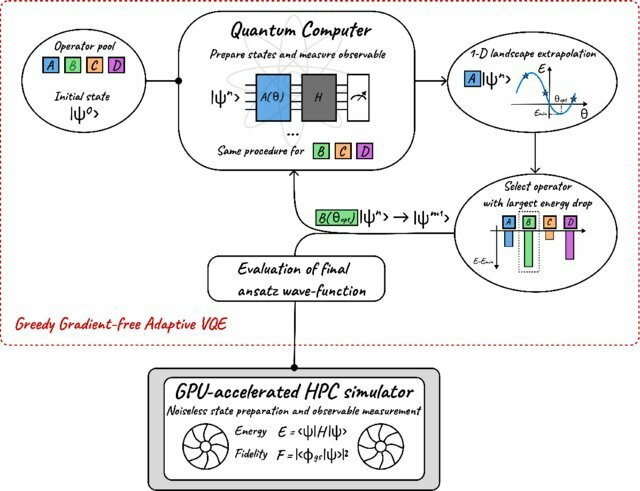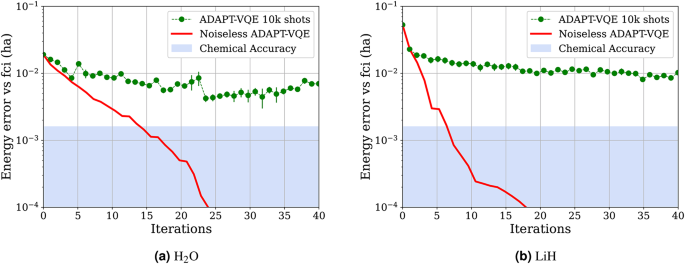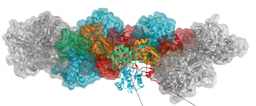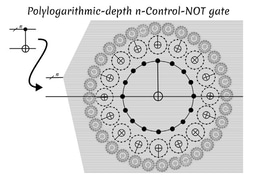Greedy Gradient-free Adaptive Variational Quantum Algorithms on a Noisy Intermediate Scale Quantum Computer
Using a 25-qubit quantum computer, we calculate the ground state of a 25-body Ising model using the newly introduced Greedy Gradient-free Adaptive VQE (GGA-VQE) approach which requires only five circuit measurements per iteration, regardless of the number of qubits and size of the operator pool.
Published in Chemistry, Physics, and Computational Sciences

The prospect of an exponential quantum speed-up in chemistry ultimately depends on fault-tolerant quantum computers, machines that are still beyond current engineering capabilities. While algorithms designed for fully error-corrected hardware remain largely theoretical, a new class of hybrid or heuristic approaches has emerged.
By off-loading part of the workload to classical processors and reducing quantum depth, these methods aim to run on today’s noisy, intermediate-scale quantum (NISQ) devices, whose qubit counts are low and coherence times limited. In quantum chemistry, the Variational Quantum Eigensolver (VQE) is the most popular NISQ-era algorithm for estimating a molecule’s ground-state energy from its Hamiltonian. Like other variational methods, standard VQE can suffer from barren plateaus—regions where cost-function gradients vanish, making optimisation in large qubit systems intractable.
The ADAPT-VQE variant tackles this issue by building the ansatz iteratively: at each step it adds the operator whose gradient has the largest magnitude. This quasi-greedy, gradient-driven construction has been shown to bypass barren plateaus issues and yields more reliable convergence. However, ADAPT-VQE requires an impractical number of circuit evaluations, both to select the next operator and to perform the global optimisation at each step. As a result, it has not been implemented on hardware and suffers severe accuracy loss under realistic shot noise in simulations.
In this study, we give ADAPT-VQE a practical makeover by using a simple trick.
In this study, we give ADAPT-VQE a practical makeover by using a simple trick.
Upon the addition of a new operator to the circuit, the energy expectation value is a simple trigonometric function of the rotation angle of the operator. Because this function can be fully determined by extrapolation from just a few measurements, we can easily locate its minimum. Consequently, we propose selecting both the next operator and its optimal angle in one step, a process we call Greedy Gradient-free Adaptive VQE (GGA-VQE):
- For each candidate operator, take a few of shots to fit the theoretical energy curve.
- Find the angle where that curve is minimal.
- Pick the operator whose lowest energy is the very lowest of them all.
-
Fix that angle in the circuit and move on, never changing already-chosen parameters.
By building the ansatz one local update at a time, GGA-VQE sidesteps the costly, noise-sensitive, and shot-intensive optimisation loops of standard ADAPT-VQE. The result is a somewhat less flexible circuit, but one that is far more compatible with today’s NISQ hardware. This procedure has been tested on a 25-qubit trapped-ion quantum computer, tackling the ground state of a trasverse field ising model.
This experiment addresses a key question: “How close are today’s quantum devices to useful chemistry computations?” While the 25-qubit processor already spans a Hilbert space that challenges naïve classical simulation, noise and shot limitations currently confine us to proof-of-principle benchmarks, such as a 25-spin Ising model. Nevertheless, this research brings key progress towards the full implementation of variational methods for quantum chemistry and proposes a first - real life - converged computation on an actual NISQ quantum computer. These demonstrations remain also essential for benchmarking actual hardware and guiding algorithm development toward ever more efficient use of quantum resources.
For a deeper dive into the algorithm’s implementation and our experimental results, refer to the original article.
Greedy gradient-free adaptive variational quantum algorithms on a noisy intermediate scale quantum computer. C. Feniou, M. Hassan, B. Claudon, A. Courtat, O. Adjoua, Y. Maday, J.-P. Piquemal, Scientific Reports volume 15, Article number: 18689 (2025)
https://www.nature.com/articles/s41598-025-99962-1
Follow the Topic
Quantum Physics
Physical Sciences > Physics and Astronomy > Quantum Physics
Quantum Chemistry
Physical Sciences > Chemistry > Theoretical Chemistry > Quantum Chemistry
Quantum Computing
Mathematics and Computing > Computer Science > Theory of Computation > Models of Computation > Quantum Computing
-
Scientific Reports

An open access journal publishing original research from across all areas of the natural sciences, psychology, medicine and engineering.
Ask the Editor – Space Physics, Quantum Physics, Atomic, Molecular and Chemical Physics
Got a question for the editor about Space Physics, Quantum Physics, Atomic, Molecular and Chemical Physics? Ask it here!
Continue reading announcementRelated Collections
With Collections, you can get published faster and increase your visibility.
Reproductive Health
This Collection welcomes submissions related to a broad range of topics within reproductive health care and medicine related to reproductive well-being.
Publishing Model: Hybrid
Deadline: Mar 30, 2026
Obesity
This cross-journal collection welcomes submissions of clinical and preclinical work that explores all aspects of obesity, including causes, pathophysiological mechanisms, incidence, prevention, treatment and impact.
Publishing Model: Hybrid
Deadline: Apr 24, 2026






Please sign in or register for FREE
If you are a registered user on Research Communities by Springer Nature, please sign in